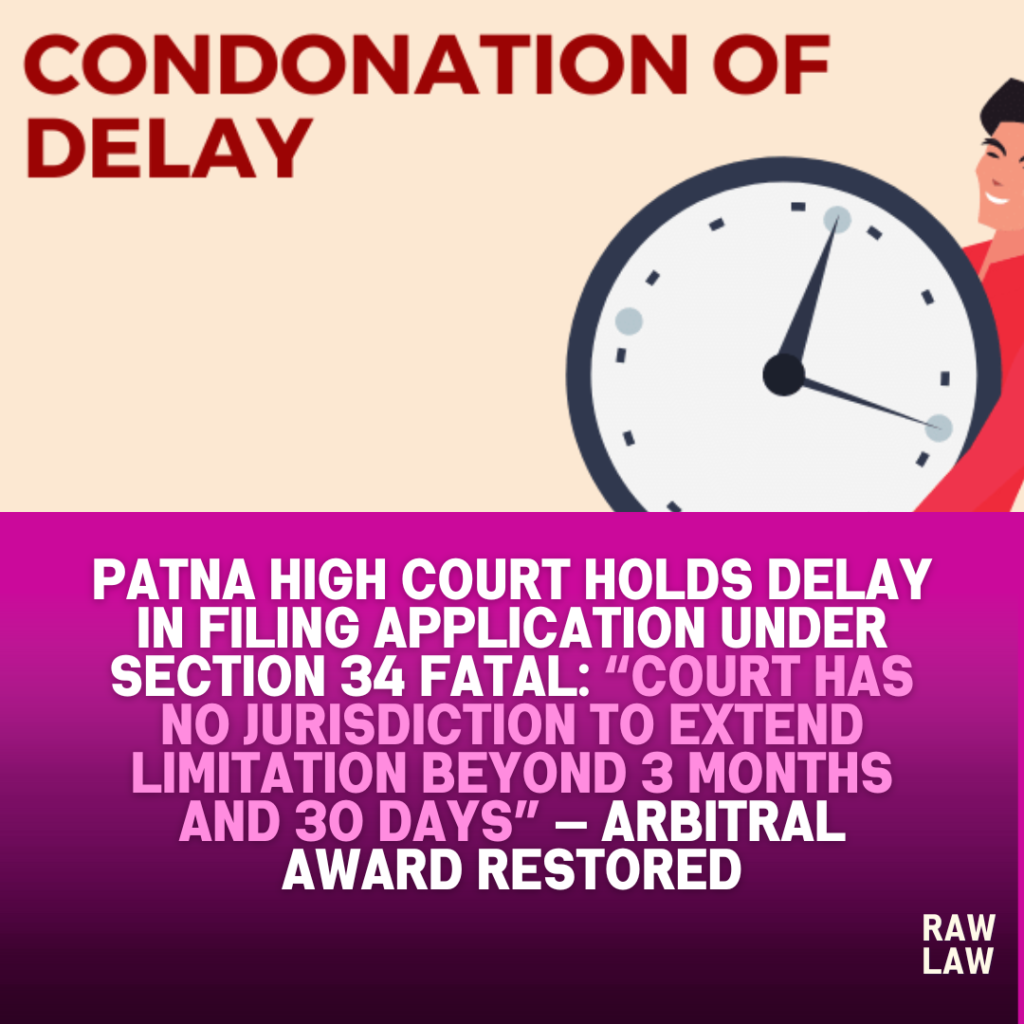Court’s Decision
The Patna High Court, in Om Prakash Saha v. Ambika Prasad Saha, allowed the appeal and set aside the order of the Additional District Judge-I, Naugachia, which had previously set aside an arbitral award dated 15.10.2007. Justice Nawneet Kumar Pandey held that the application under Section 34 of the Arbitration and Conciliation Act, 1996, was filed beyond the statutory limitation period and thus, was not maintainable. The Court observed that once the limitation period of three months and the extended period of 30 days expire, “the Court has no jurisdiction to extend the period of limitation under any pretext.”
Facts
The appellant and the respondent are real brothers. The dispute arose from an arbitral award dated 15.10.2007, which partitioned the family properties. The respondent claimed that the award was concocted and obtained behind his back using his signature on a blank paper. He contended that he was unaware of the award until 14.05.2009, when he learnt of an execution case based on the award. He then moved an application under Section 34 to set aside the award.
The appellant, on the other hand, asserted that both parties had mutually agreed to arbitration, nominated arbitrators, and that the award was duly communicated to the respondent via courier and registered post. He argued that the Section 34 application was time-barred and the court below lacked jurisdiction.
Issues
- Whether the application under Section 34 was maintainable?
- Whether the application was barred by limitation under Section 34(3) of the Act?
- Whether a valid arbitration agreement existed?
- Whether the arbitral award was procured by fraud or collusion?
- Whether the applicant participated in the arbitration?
- Whether the respondent was properly informed about the award?
- Whether the order passed by the Additional District Judge was without jurisdiction?
Petitioner’s Arguments
The appellant contended that:
- The application under Section 34 was filed well beyond the permissible period, making it non-maintainable.
- The respondent was aware of the award and had been served both through post and courier.
- The arbitration process was mutual, and arbitrators were appointed by both sides.
- The Additional District Judge did not have jurisdiction under Section 2(1)(e) of the Act to adjudicate the Section 34 application.
- The respondent had participated in the proceedings and had accepted service.
Respondent’s Arguments
The respondent argued that:
- He had not entered into any arbitration agreement and had no knowledge of the arbitral proceedings.
- The award was fraudulent, fabricated, and done without his consent.
- He came to know about the award only upon being informed by an advocate’s clerk in May 2009.
- The court below had jurisdiction under Section 2(1)(e), relying on Shivam Housing Pvt. Ltd. v. Mithilesh Kumar Singh.
- He was prevented from filing the application earlier due to lack of knowledge.
Analysis of the Law
The Court focused on Section 34(3) of the Arbitration and Conciliation Act, 1996, which provides:
“An application for setting aside may not be made after three months from the date on which the party making that application had received the arbitral award…”
It emphasized that even with sufficient cause, the maximum permissible extension is 30 days, after which the Court loses jurisdiction to entertain the application.
Precedent Analysis
The Court relied upon:
- Assam Urban Water Supply & Sewerage Board v. Subash Projects & MKTG. LTD., where the Supreme Court held that no delay beyond the 30-day extension period under Section 34(3) is condonable.
- Union of India v. M/S Jailal Kishore Lal, (2010) 3 BLJ 129 – for interpreting the definition of “Court” under Section 2(1)(e).
- Distinguished this from Shivam Housing Pvt. Ltd. v. Mithilesh Kumar Singh, where a broader interpretation of “Court” included Additional District Judges.
Court’s Reasoning
- The respondent admitted during cross-examination that he received the award on 17.04.2008 via Registered Letter No. 3349.
- The Section 34 application was filed on 06.06.2009, far beyond the statutory maximum of 120 days.
- The respondent’s version that he became aware only in May 2009 was rejected based on his own admission in court.
- The lower court erred in not deciding Issue No. 2 regarding limitation, despite it being a framed issue.
The Court concluded:
“This inordinate delay cannot be condoned as per the mandate of the proviso of Sub-section (3) of Section 34 of the Act.”
Conclusion
The High Court declared the application under Section 34 as time-barred and held that the order dated 03.11.2013 setting aside the arbitral award was unsustainable in law. The order was quashed, and the appeal was allowed.
Implications
- Reinforces the strict limitation period under Section 34(3) of the Arbitration Act.
- Confirms that once the statutory limit of 120 days expires, courts have no discretion to condone delay.
- Clarifies the importance of framing and deciding limitation issues in arbitration challenges.
- Provides clarity on the jurisdiction of courts under Section 2(1)(e) post Shivam Housing.
Cases Referred and Their Relevance
- Assam Urban Water Supply & Sewerage Board v. Subash Projects & MKTG. LTD. → Reaffirmed that delay beyond 120 days in challenging an award is not condonable.
- Union of India v. M/S Jailal Kishore Lal, 2010 (3) BLJ 129 → Explained the limited scope of the term “Court” under Section 2(1)(e).
- Shivam Housing Pvt. Ltd. v. Mithilesh Kumar Singh → Held that Additional District Judges can be considered “Courts” under the Act, a position contested here.



